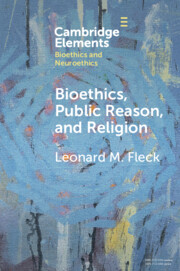Refine search
Actions for selected content:
2 results
5 - Practicing Discreetly
-
- Book:
- Respectable Muslims
- Published online:
- 18 December 2024
- Print publication:
- 19 December 2024, pp 116-147
-
- Chapter
- Export citation

Bioethics, Public Reason, and Religion
- The Liberalism Problem
-
- Published online:
- 12 August 2022
- Print publication:
- 01 September 2022
-
- Element
- Export citation
